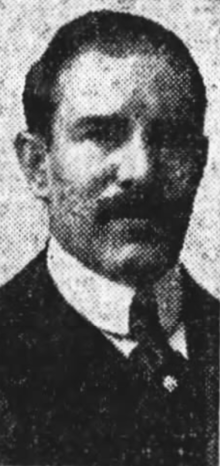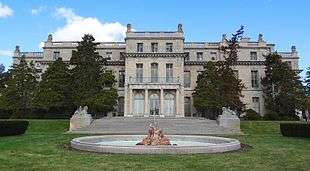Hubert T. Parson
Hubert Templeton Parson (September 18, 1872 – July 9, 1940) was an American businessman who served as president of the F. W. Woolworth Company.
Hubert T. Parson | |
|---|---|
 | |
| President of the F. W. Woolworth Company | |
| In office 1919–1932 | |
| Preceded by | Frank Winfield Woolworth |
| Succeeded by | Byron D. Miller |
| Personal details | |
| Born | Hubert Templeton Parson September 18, 1872 Toronto, Ontario |
| Died | July 9, 1940 (aged 67) New York City, New York, U.S. |
| Resting place | Green-Wood Cemetery |
| Spouse(s) | Maysie Adelaide Gasque
( m. 1893; |
| Residence | Shadow Lawn |
| Education | Boys High School |
Early life
Parson was born on September 18, 1872 in Toronto, Ontario. He was a son of Eliza S. (née McGibben) Parson and Henry Edwin Parson, a former oil operator who made a fortune but lost it due to fires and the discovery of oil in Oil City, Pennsylvania. He had two brothers, Charles Parson (of Missoula, Montana) and Stuart Parson (of Bronxville, New York).[1]
When he was seven years old, his parents brought him to Brooklyn. After receiving his education at the Boys High School in Brooklyn, where he completed a course in bookkeeping.[1]
Career
Parson's message to the stores upon his promotion to President, June 13, 1919
After his graduation from the Boys High School, Parson worked several jobs in Brooklyn, first with the Atlantic Chemical Company, then, at age 19, becoming a partner in a chicory importing business.[1]
In the spring of 1892,[2] Parson began working with the F. W. Woolworth Company as a $12 a week bookkeeper, obtaining that position through a 5-cent "want ad" when the Woolworth executive staff consisted of only four men. In 1905, he became treasurer,[2] and eventually, after the death of Carson Peck in 1916, he became general manager and vice president of the Woolworth Company in 1917.[3]
Following the death of Frank W. Woolworth in 1919,[4] Parson (who was always thought of by Woolworth as the son he never had)[5] served as the second president of the company before retiring in 1932 (just before the company's 60-year age limit), responsible for the founding of over 2,000 stores.[6]
Personal life
In 1893, Parson was married to Maysie Adelaide Gasque (d. 1956). Maysie's brother, Clarence Warren Gasque was the director of Woolworth's in England. Parson walked Clarence's daughter, Maysie Gasque, down the aisle at her July 1930 wedding to Roland Robinson (later 1st Baron Martonmere) at St Margaret's Church, Westminster where Princess Mariza Chavchavadze was a bridesmaid.[7] Maysie and Roland were the parents of Loretta Anne Robinson, who later married Edward S. Rogers Jr., the president and CEO of Rogers Communications Inc.[8]
Parson died at New York Hospital in New York City on July 9, 1940.[1] After a service at Fairchild Chapel, he was buried at Green-Wood Cemetery in Brooklyn. His widow, who was then living at 998 Fifth Avenue, died in May 1956.[9][10]
Residences

The Parsons owned a house down the street from F.W Woolworth (who was at 990 Park Avenue) at 1071 Fifth Avenue in New York (today the site of the Solomon R. Guggenheim Museum) and a large home at 72 Avenue Foch in Paris,[5][11] which later was confiscated by the Nazis and became the base of operations for the Gestapo in Paris.[12] At the time of his death, they were residing at 420 Park Avenue.[1][13]
In 1918, Parson bought Shadow Lawn, a colonial, wood-frame structure mansion in West Long Branch, New Jersey (not far from the resort town of Asbury Park),[5] from Joseph B. Greenhut, head of the Siegel-Cooper Company for $800,000 in cash plus a $150,000 mortgage.[6] The mansion, which was originally built in 1903 for John A. McCall (president of the New York Life Insurance Company), contained fifty-two rooms and was the subject of a $1 million dollar renovation by Parson after he acquired it. During the 1916 presidential campaign, Greenhut had loaned Shadow Lawn to President Woodrow Wilson, who used the mansion as his Summer White House. In 1927, the home was destroyed by a fire and,[15] in 1929, Parson built a new mansion which contained 130 rooms and cost a reported $10.5 million to build.[16] The home was designed by Philadelphia architect Horace Trumbauer in the American Beaux-Arts style and built by Thompson-Starrett Company of New York, who built the Woolworth Building in New York City. The exterior gardens were by Achille Duchêne and the interior design was crafted by Julian Abele, one of the first professionally trained African American architects in the United States.[17] Parson and his wife, along with her mother and sister (who worked in the New York office of Woolworth),[18] all lived at Shadow Lawn.[19]
In 1939, Parson, who was financially ruined by the Great Depression, lost Shadow Lawn to the town for nonpayment of $132,000 in taxes. The home later served as a military hospital and the site of a private school before Monmouth University acquired it in 1955 for $350,000.[17]
References
- "H.T. PARSON DEAD; A WOOL WORTH AIDE; President of Five and Ten Chain, 1919–32, Suffers Heart Attack Here WITH CONCERN 40 YEARS He Began as Bookkeeper and Later Directed Thousands of Stores Until Retirement Succeeded Woolworth in 1919 Father Was an Oil Operator" (PDF). The New York Times. July 10, 1940. Retrieved September 10, 2019.
- "The succession in 1919". www.woolworthsmuseum.co.uk. The Woolworths Museum. Retrieved September 11, 2019.
- "To succeed C.C. Griswald. The Woolworth Company Announces the Selection of H.T. Parsons". The New York Times. January 29, 1916. Retrieved June 27, 2008.
Announcement was made yesterday by the F.W. Woolworth Company that Hubert T. Parsons, present Secretary and Treasurer of the company, was to be appointed ...
- "H.T. Parson to Head Woolworth Stores. Acting President Since Death of Founder of System Named as Successor. C.S. Woolworth Elected to Newly Created Position as Chairman of the Board". The New York Times. June 12, 1919. Retrieved December 4, 2011.
H.T. Parson was elected President of F.W. Woolworth Co. yesterday at the organization meeting of the Directors, to succeed the late Frank W. Woolworth, founder of the system of 5 and 10 cent stores.
- Plunkett-Powell, Karen (2001). Remembering Woolworth's: A Nostalgic History of the World's Most Famous Five-and-Dime. Macmillan. p. 132. ISBN 9780312277048. Retrieved September 11, 2019.
- Foreman, John (October 15, 2014). "BIG OLD HOUSES: The Rise of Hubert T. Parson". Big Old Houses. Retrieved September 10, 2019.
- "BRILLIANT WEDDING FOR MAYSIE GASQUE American Woman Bride of J.R. Robinson in St. Margaret's Church, London. HAS TWELVE BRIDESMAIDS They Come From Five Countries— Curious Throng Curbed by Police —Couple Flies to Paris. Drawing Room Auto for Honeymoon" (PDF). The New York Times. July 10, 1930. Retrieved September 11, 2019.
- Hasselt, Caroline Van (2010). High Wire Act: Ted Rogers and the Empire that Debt Built. John Wiley & Sons. pp. 83–84. ISBN 9780470739747. Retrieved September 11, 2019.
- "PAYS $30,592 TAX LIEN Mrs. H.T. Parson Settles Levy on Furniture at Jersey Estate" (PDF). The New York Times. March 23, 1940. Retrieved September 10, 2019.
- "MRS. H.T. PARSON DIES Widow of Former President of Woolworth Company" (PDF). The New York Times. April 29, 1956. Retrieved September 10, 2019.
- "OHS Database: Instrument Details". www.pipeorgandatabase.org. The Organ Historical Society. Retrieved September 11, 2019.
- Kershaw, Alex (July 27, 2015). "AVENUE OF SPIES – A True Story of Terror, Espionage, & One American Family's Heroic Resistance in Nazi-Occupied Paris". War History Online. Retrieved September 11, 2019.
- Fritzsche, Peter (August 26, 2015). "Surviving the Nazis". The New York Times. Retrieved September 11, 2019.
- "WILSON SUMMER HOME WILL BE RESTORED Hubert T. Parson Announces Plans to Replace Shadow Lawn With $1,000,000 Mansion" (PDF). The New York Times. February 2, 1928. Retrieved September 10, 2019.
- Hinds, Michael Decourcy (June 25, 1981). "A MANSION FOR DADDY WARBUCKS". The New York Times. Retrieved September 10, 2019.
- "History of Wilson Hall". www.monmouth.edu. Monmouth University. Retrieved September 10, 2019.
- Winkler, John K. (2017). Five and Ten: The Fabulous Life of F. W. Woolworth. Pickle Partners Publishing. p. 122. ISBN 9781787207905. Retrieved September 11, 2019.
- Reme, Jim; Navarra, Tova; R.N, Tova Navarra (2002). Monmouth University. Arcadia Publishing. p. 8. ISBN 9780738510101. Retrieved September 11, 2019.